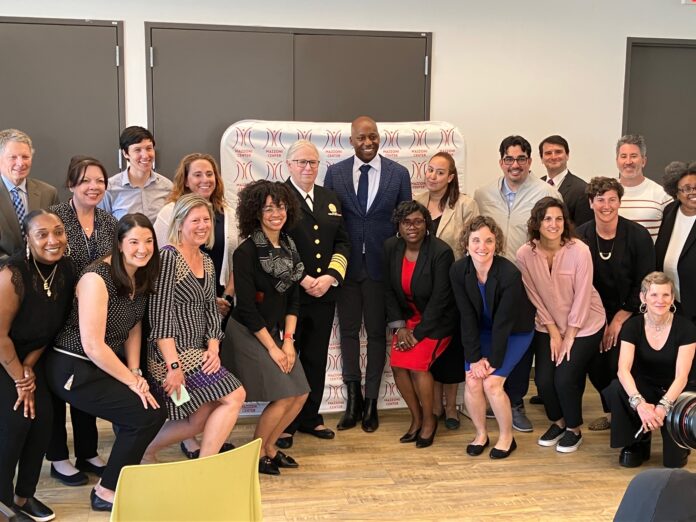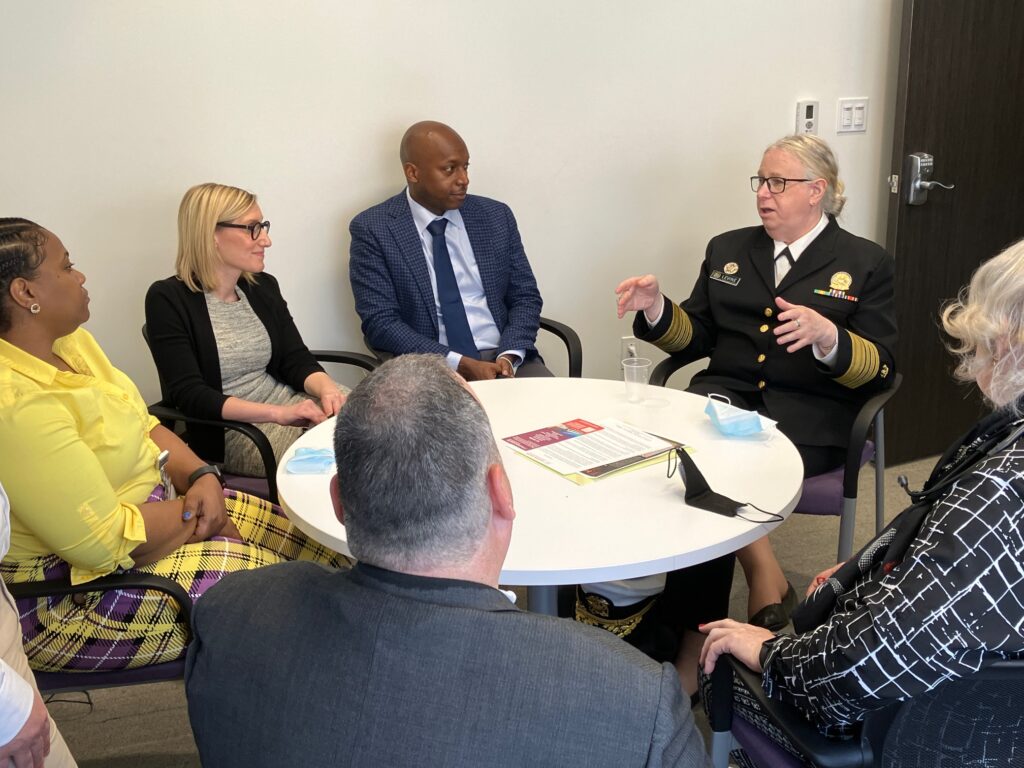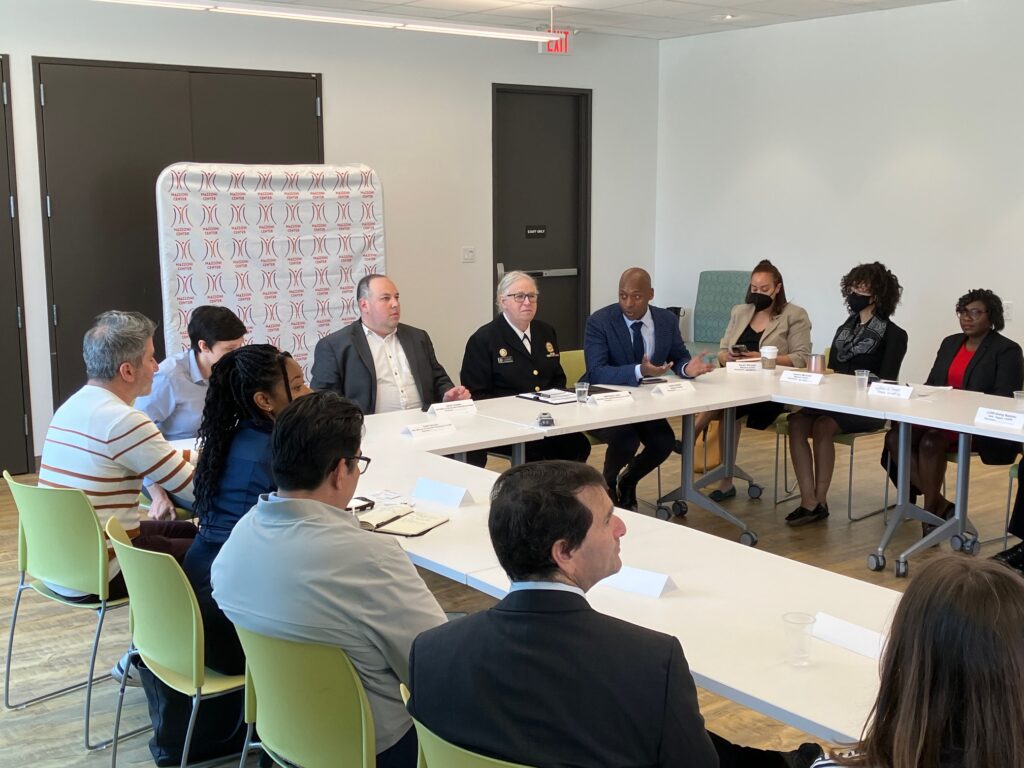
Admiral Rachel Levine, Assistant Secretary for Health for the Biden administration, toured Mazzoni Center on Friday, April 21 and took part in a discussion about PrEP as well as a roundtable on nutrition.
Dr. Stacey Trooskin, acting executive medical officer at Mazzoni Center, led the PrEP discussion, which included a conversation about STI and hepatitis C testing and treatment. Mazzoni physicians and Mazzoni President and Executive Director Sultan Shakir also took part in the discussion, as did Adrian Shanker, Levine’s senior advisor on LGBTQI+ health equity.
One challenge related to PrEP access, Trooskin said, is that youth who are still on their parents’ insurance may not want their parents to know they’re taking PrEP. As a pediatrician, Levine said that she too ran into challenges when it came to ensuring adolescent confidentiality when she worked at Penn State.
“That issue threatens one of the fundamental tenets of adolescent care for 60 years, in terms of their confidentiality and consent,” Levine said. “I’m aware about the challenges in terms of billing for adolescents. I don’t have a magic solution for that.”
Shanker asked Mazzoni physicians about whether they’re seeing any unresolved roadblocks in terms of insurance coverage for injectable PrEP. One big issue is that Mazzoni only has one specialty pharmacy where they can get approvals for injectable PrEP. As such, patients aren’t always able to access the medication at a pharmacy that’s convenient for them.
“There are tremendous workforce burdens here,” Trooskin said. “If you’re working in a setting that doesn’t have the dynamic staff at the Mazzoni Center, with expertise at navigating some of this, if you’re in our more rural community, it’s going to be particularly challenging.”
Shanker explained that clinics like Mazzoni can have more than one pharmacy arrangement for PrEP access. Mazzoni leaders have applied for Federally Qualified Health Centers look-alike status, Trooskin said, but at the moment they’re focused on HIV and STI prevention and treatment through the Title X program, which is designed to make sure that everyone can access vital preventive reproductive healthcare.

The conversation then shifted to STI infections. Since the creation of the National STI Strategic Plan several years ago, Levine said, the rate of syphilis infections, including congenital syphilis, has increased dramatically.
Philadelphia data indicates “an all-time high” rate of new syphilis infections in the last decade. Mazzoni staffers have tested over 1,000 patients, which revealed a 40% positivity rate, Trooskin said. Many of those testing positive for syphilis are men who have sex with men and trans women. All parties agreed that Mazzoni must increase its STI testing, and that insurance companies would likely cover increased screening given the need, Levine said.
“If you find out that you’re not getting coverage approvals for that, we would like to know,” Shanker added.
The group concluded the meeting with a conversation about testing and treatment for hepatitis C, and the role of community health centers in eradicating viral hepatitis.
“I think that community health centers would play a very large role in terms of that,” Levine said. “I am the biggest community health center fan that you’re ever going to find. We would love to partner with community health centers; in theory would love to partner with Mazzoni. All of this is premature because the budget hasn’t gotten to Congress yet.”
Faith Mole, director of Community Health Initiatives at Mazzoni, said that despite the fact that Mazzoni has funding for testing, they’re struggling with funding for treatment, especially if a patient is without insurance, if they’re reluctant to use their parents’ insurance, or if they’re undocumented.
“We are trying to now be more intentional about getting more youth involved in testing and treating them as well,” Mole said.
Trans and nonbinary individuals are among the most vulnerable populations when it comes to overall healthcare access, a reality which is exacerbated by a deluge of conservative attacks on gender-affirming care for trans youth.
“We are very concerned about the advances of these really hateful actions and bills across the United States,” Levine told PGN. “We’re going to do everything we can to advance the cause of LGBTQI+ equality. This will be in terms of different regulations; it’s going to be in terms of actions from the justice department and really standing up and providing leadership to our community as they face these different challenges.”
Following the discussion about PrEP, Levine and health department staff members participated in a roundtable discussion about nutrition with Mazzoni team members and staffers from local food and health organizations, including Philabundance, MANNA, Bebashi Transition to Hope, the Philadelphia Department of Public Health, the School District of Philadelphia and others.
Food Is Medicine programs, food deserts and the importance of community fridges were features of the discussion. Karen Minyety, care services program director at Mazzoni, brought up food access as an important component of medical treatment in some cases, especially for people living with HIV who need to take antiretroviral medication.
“We’re asking folks in their medical appointments, why aren’t you taking your medication,” Minyety said. “But we’re not thinking about, do they have a place to safely store and prepare meals? Can they access nutrition and food regularly so that they comply with treatment here?”

Janice Tosto, hunger relief supervisor at Bebashi, brought up the work of Dr. Mandy Smith, who works at Grady Memorial Hospital in Atlanta, and her intention of starting a Food Is Medicine program for survivors of gun violence. Tosto said that she would like to figure out how to establish a Food Is Medicine program for Bebashi’s food pantry, which she manages.
“We serve our clients who are living with HIV, so we’re always aware that they have to have access to certain foods so they can take their medicine,” Tosto said. “We’re really being intentional about the kind of food that we offer because a lot of our clients in addition to HIV, they’re living with cancer and kidney disease and other types of illnesses.”
The social determinants of health that impact proper nutrition, like housing insecurity and overall poverty, also took the spotlight in the discussion.
“The discussion of housing, transportation, education, economic opportunity – to me, all of those are health issues,” Levine said. “Really, the entire administration is one big health department. All those different agencies, to me, are involved with health, and we do collaborate with them.”
